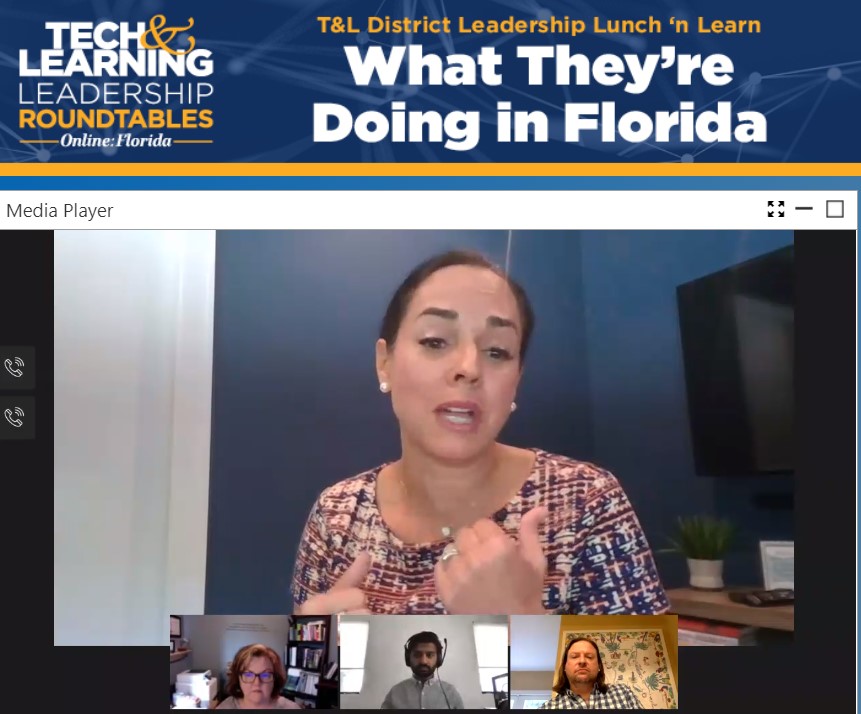Tech & Learning Remote Learning Series: What They’re Doing in Florida
Leaders from Miami-Dade County Public Schools and Escambia County School District shared how remote learning has been implemented

COVID-19 has had an unprecedented impact on education worldwide, which has brought to light the profound need for remote learning.
In this virtual roundtable conversation, Dr. Kecia Ray talked with Marie Izquierdo, Chief Academic Officer, Miami-Dade County Public Schools, and Tom Ingram, Director, Information Technology for Escambia County School District, about how each district went about its remote learning strategy in regard to short- and long-term planning. They were joined by Advait Shinde, CEO/Co-Founder of GoGuardian.
Izquierdo talked about how Miami-Dade is sustaining ongoing professional development and sharing remote teaching strategies and best practices. Ingram discussed how Escambia is managing devices remotely and planning for next school year, and shared what he is seeing through his work as the CoSN Council of Florida Officers.
Watch the on-demand version here
Key Takeaways
Family ties. Marie Izquierdo, Chief Academic Officer, Miami-Dade County Public Schools, discussed how with 430 schools featuring students from 100 countries who speak 56 different languages, getting family input was critical. At the beginning of the crisis, they sent out a survey focused on access to families, which helped in deciding how to deploy more than 100,000 devices. The district’s Parent Academy Virtual Campus also has been crucial to remote learning success, as it offers webinars (in three languages) and other resources to support parents at home. So far, the district has 91% attendance online. “Parents are going to be demanding a lot more of us after this experience, and they should,” said Izquierdo.
Remote support. Izquierdo also detailed how at the beginning of remote learning, Miami-Dade set aside two days for PD, and supplemented that with more than 40 online courses for teachers. Teachers have been encouraged to use the platforms with which they’re most comfortable, and the district provides best practices, supports, and other training, which has helped remote teaching approaches become more sophisticated. For example, district usage of Microsoft Teams has gone from 18,000 to more than 200,000.
Preparation pays. “We already had some pieces in place that have helped us tremendously,” said Tom Ingram, IT Director, Escambia County School District, a diverse, mid-sized Florida district with high poverty. Before the crisis, the district had established a clear resource vetting process, including a detailed vendor questionnaire, so as they were inundated with offers, they had something reliable for assessing new tools, although they have primarily stayed with products from trusted vendor partners. The district's Digital Resources can be found here.
Tech & Learning Newsletter
Tools and ideas to transform education. Sign up below.
Bird’s-eye view. Advait Shinde, CEO/Co-Founder of GoGuardian, shared that his company has been tracking remote learning data and how the crisis is affecting schools. The majority of students are now back online, and there’s been a significant increase in volume of students using education platforms outside of traditional school day hours and even over the weekend. Educators are adopting new digital tools to connect with students, and they’re doing so for more than just homework.
Finding funding. When it comes to paying for remote learning, Izquierdo said that Miami-Dade County Public Schools asked taxpayers in 2012 to support connectivity and access, then took out a loan to purchase 200,000 devices. They also partner with Verizon and Sprint, which have helped provide access to students in need.
Retrieving devices. Ingram said that in Escambia, they anticipate seniors to turn in devices and textbooks as part of being cleared for graduation. They’re also seeing very low loss of items with students, and that the situation is not anywhere near as bad as people think. The district is allowing students to keep Chromebooks over the summer, and is keeping digital resources populated until July 17 for added enrichment. Izquierdo added that Miami-Dade is hoping to eventually have CDC-compliant Open House events when restrictions are lifted to re-connect with students and retrieve devices.
Students with special needs. “Special needs students have been part of our plan from the beginning,” said Izquierdo. “The support systems have not changed, they’ve gone virtual.” Miami-Dade continues to communicate what platforms are being used, who is involved, and when sessions will take place. “It’s business ‘unusual’ when it comes to delivering the services our students need,” she added.
In Escambia, district leaders are finding ways to make it work, said Ingram. He also added that those pieces need to be added to the regular plans going forward.
Looking forward. This crisis has shined a spotlight on digital equity, Izquierdo said. “Internet connectivity is a 21st century civil right,” she said. “Everyone needs to have access.” She also expects to see parents having a better understanding of competency, personalized and blended learning, and demand more of it. Teacher expectations regarding students having to be in the classroom to learn have also changed.
Mental health is a widespread concern in K12, so educators are going to have to monitor this closely going forward, said Shinde.
Lunch 'n Learning with Tech & Learning
This report is part of Tech & Learning's District Leadership Lunch ‘n Learn Roundtable series, hosted by Dr. Kecia Ray. In this series, districts from across the U.S. share their strategic plans, the challenges they are facing, and the creative solutions they are using to support students and teachers. Access previous webinars and register for our upcoming events here.
More from T&L: Lunch 'n Learn roundtable recaps
Ray Bendici is the Managing Editor of Tech & Learning and Tech & Learning University. He is an award-winning journalist/editor, with more than 20 years of experience, including a specific focus on education.
